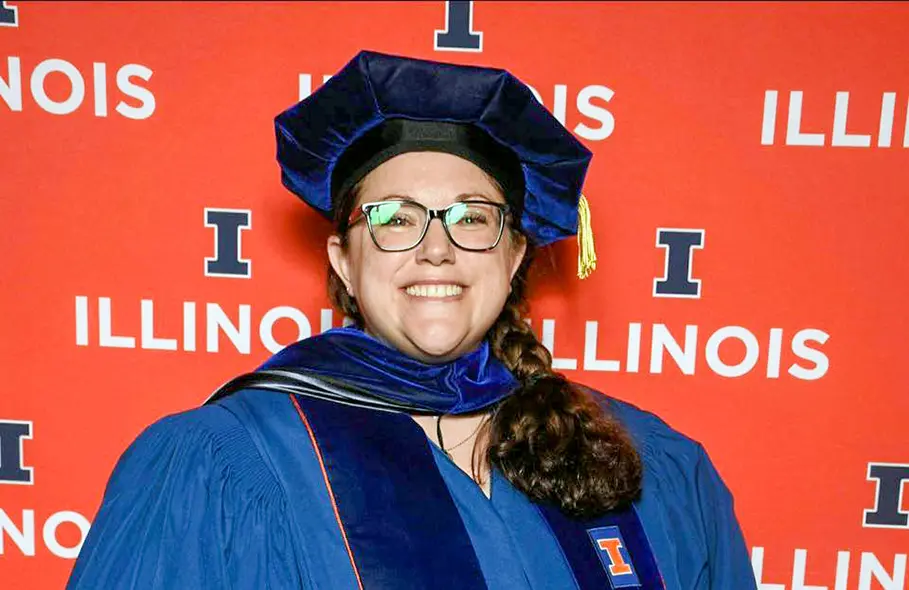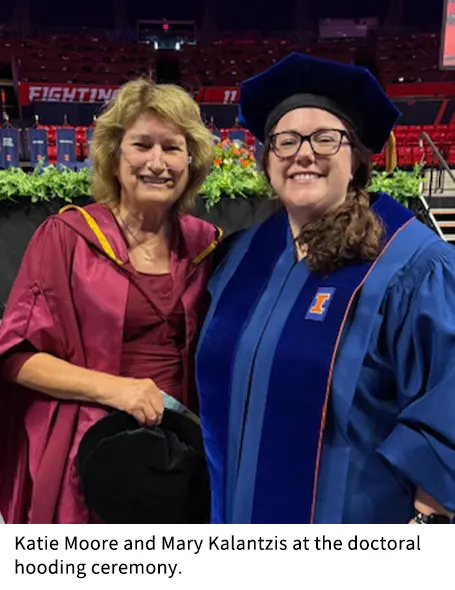Following the Signs to Find Her Passion
by Orion Buckingham / Jul 9, 2025

Alumna Katie Moore, ’10 LAS, Ed.D. ’25 EPOL, recalls stepping onto the famous floor at State Farm Center as a high schooler. She’d come to Champaign for the IHSA state wrestling tournament as a cheerleader and American Sign Language signer of the National Anthem. And in that special, surreal moment, she was all-in on becoming a future Illini.
In May 2025, Moore’s experience came full circle as she returned to State Farm Center for the Graduate College’s Doctoral Hooding Ceremony. She crossed the stage and was recognized for earning her Ed.D. in Learning Design & Leadership from the College of Education.
And for Moore, this represented more than another diploma and getting “Dr.” in front of her name. It meant overcoming the odds. She became one of the less than one percent of deaf people who complete a graduate degree.
Finding Her Way Forward
Born and raised in Riverton, Illinois, Moore was discovered to have hearing loss around the age of four, which worsened as she aged. “My mom did her research and provided me with all options: hearing aids, speech therapy, and learning sign language,” Moore says.
She navigated public schools using an ASL interpreter, and during her sophomore and junior years of high school, Moore attended the Illinois School for the Deaf (ISD) in nearby Jacksonville.
Soon, Moore’s dream of being an Illini became a reality. She accepted her offer to the College of Liberal Arts and Sciences, majoring in English Rhetoric and Composition. But a sense of loneliness quickly overshadowed the thrill of being on campus. Moore explains that her hearing loss was more than just a loss of one of her senses.
“As I got older and my hearing got worse, I became a recluse—very isolated, even from my own family,” she says. “I didn’t want to talk to anyone because I couldn’t hear them.”
As a college sophomore, Moore underwent surgery for cochlear implants that returned some of her hearing. She also embarked on a Disney College Internship and spent seven months in Florida. “Working at Disney forced me out of my shell to interact with people. I worked in the stores, so I had to interact with guests. It made me open up to strangers.” Being able to hear them gave Katie confidence.
After graduating with her bachelor’s degree, Moore got an office job that put her behind a computer all day. She missed interacting with people, but working as an educator was the furthest thing from her mind. So when her former cheer coach from the ISD sent her an email saying that Jacksonville High School needed an ASL teacher, Moore said, “No, thanks.” She’d never wanted to be a teacher.
“But when I learned the position at Jacksonville High School would be eliminated if nobody applied, I changed my mind. I decided to give teaching a shot,” she says. It was a sign. One that would send her on a path towards her calling.
Discovering a Passion for ASL
Moore slowly fell in love with teaching, and by 2017, she was pursuing a master’s degree in teaching American Sign Language. “I was learning about teaching methods, curriculum development, assessment, and more,” she says, “I just really fell in love with it.”
With her master’s degree finished, Moore moved from high school instruction to an assistant professor role at Eastern Kentucky University’s American Sign Language & Interpreter Education program.
But then it came time to pursue the next step in her own academic pursuits.
“I began looking at doctoral degree programs and knew I wanted something in Leadership,” Moore says. Eventually, her research led her back to Illinois and the Learning Design and Leadership program in the Department of Education Policy, Organization & Leadership.
“The program looked impressive, and the cost was reasonable. Illinois has a great reputation, and I was already proud of my status as an alumni so I wanted to make sure I continued my education here,” says Moore. She also credits the university’s long track record of strongly supporting students with disabilities as a major factor in returning to Illinois.
A Community that Conquers Challenges
Moore found the LDL program atmosphere inviting, with many supportive colleagues and mentors like EPOL professors Mary Kalantzis and Bill Cope.
“From day one, they made me feel welcomed, supported, and like I could do this degree,” Moore says. “There were many times I wanted to give up, and they pushed me to finish.”
Kalantzis says Moore was a great fit for the program and vice versa.

“She was a marvelous contributor to our classes. We use CGScholar, which offered her more opportunities to participate than most Learning Management Systems,” says Kalantzis. “We have a structured peer review, all our lectures are pre-recorded with subtitles, and students make weekly posts and comment on each other’s posts.”
The LDL classes allowed Katie to do most of her coursework by typing and not signing and interpreting. The flow of thoughts and exchange of ideas is crucial to higher education learning environments, and as a student, Moore had often felt a step behind her colleagues. “It was very hard to participate in classes as a deaf person, because I’m receiving my information with a slight delay, and then if I wanted to say something, I had to type it, but then the group already moved on to another topic,” says Moore.
Assignments that require speech take more time for deaf students to complete. As a doctoral student, Moore had to sign all her presentations and then add captions for, as she calls it, “the signing impaired.”
A lack of ASL interpreters with advanced skills can also be an issue. “To join classes, meetings, defenses, and more, we must have appropriate-level ASL interpreters,” says Moore. She says interpreters are not always available or able to understand and interpret what is discussed in advanced degree courses. Moore paid out of pocket for experienced interpreters for her preliminary exam and final defense, which not every student can afford.
Extra challenges within higher education are not uncommon for those with hearing loss and deafness. Per the National Deaf Center on Postsecondary Achievement, less than one percent of those with hearing impairment obtain a Ph.D., JD, or MD. To compare, deaf people trail hearing people in overall college degree completion by 50%.
Breaking Boundaries for Disabled Students Everywhere
Kalantzis recognizes the inspiration that Moore gives other students with disabilities. “This is a remarkable achievement for a historically marginalized minority. Even more importantly, her research will make a significant contribution in the quest to provide opportunities for deaf people.”
Moore is revising her dissertation into a journal article focusing on using telecollaboration in hearing, second-language learners of American Sign Language, using innovative pedagogical approaches and technologies. She recently accepted an assistant professor role at Southern Illinois University in the Languages, Cultures, and International Studies department, where she’ll continue to teach ASL.
What she’s accomplished already is not lost on her. “It feels amazing,” she says. “It can be exhausting being a deaf person in a hearing world, especially constantly navigating communication barriers. There is also a lack of representation and role models. I hope that as more deaf people get their doctorates, we can change this and inspire others to aim for advanced degrees.”